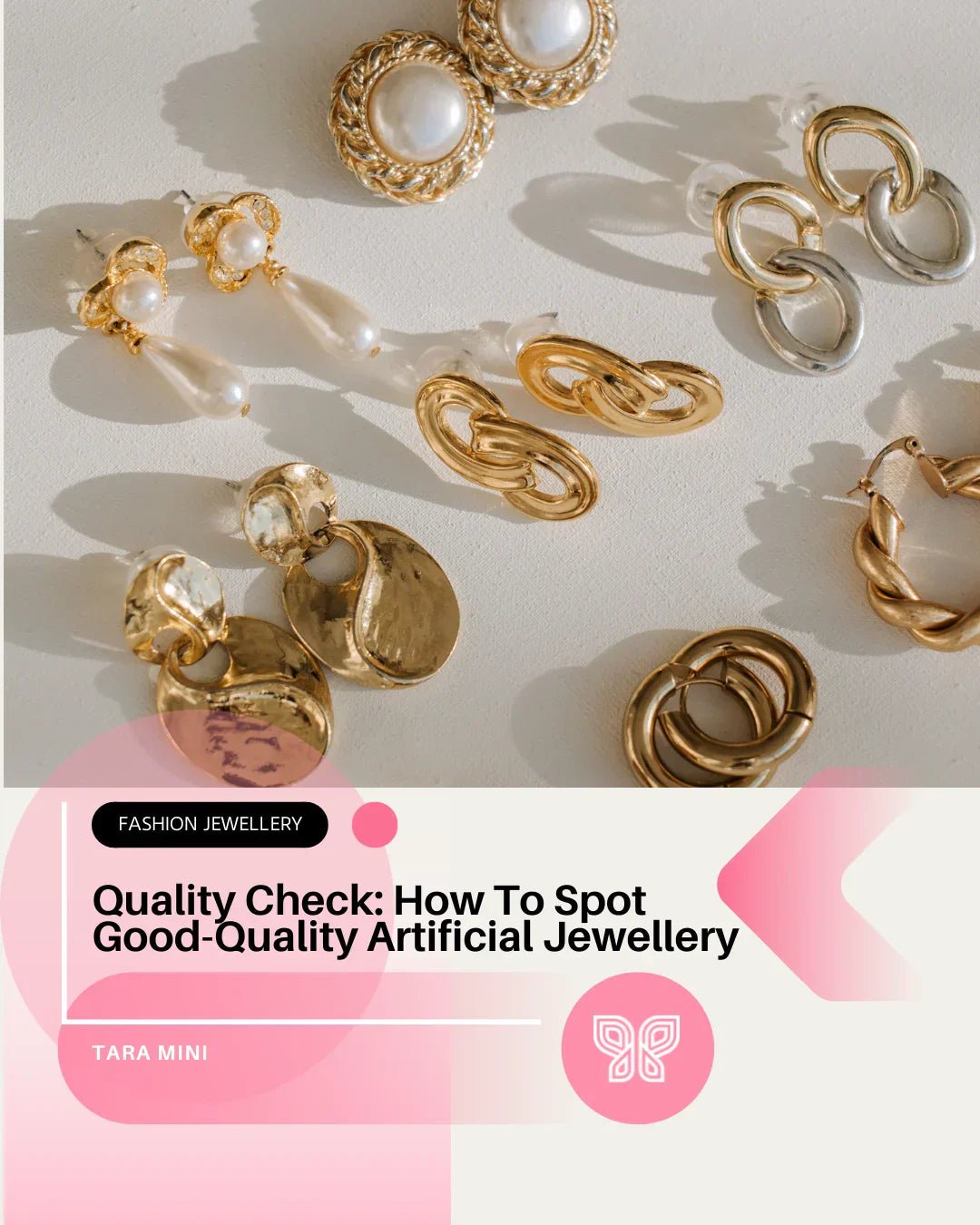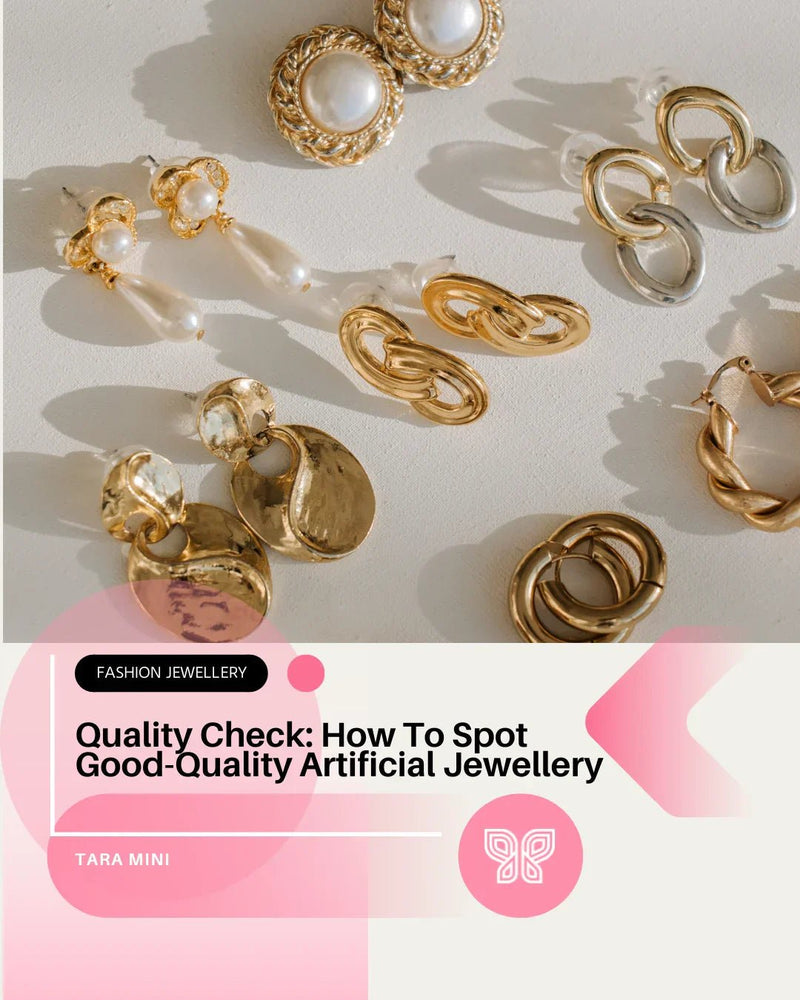Artificial Jewellery is a feeling. Whether it's in a dainty bracelet you picked up during your trip or in a soirée look brought to life with your mom’s heirloom necklace, jewels are reminiscent of memories, places, and people. Beyond these pieces that turn into conversations, artificial jewellery is a great addition to take your appearance up a notch.
So, if you’re trying to find your next statement piece, allow us to help you scour the best. Ahead, we have put together the ultimate guide to how to identify good costume jewellery that will stand the test of time.
Does Quality Matter For Artificial Jewellery?
Yes, artificial jewellery seldom ever breaks the bank. But that doesn't mean it cannot be long-lasting.
Picture this: What if you purchased a beautiful piece of durable fashion jewellery that becomes your go-to for every occasion? While it takes time, effort, and a discerning eye to find such quality imitation jewellery pieces, here’s why quality matters.
- Long-lasting: Jewellery that has been made with a pure heart, like the ones at Tara Mini, retain their alluring shine and shape through the years.
- Elevated Comfort:Quality imitation jewellery is made carefully to ensure that it does not cause skin irritation and is comfortable for the wearer.
- Better Appearance: The whole purpose of such jewellery is to give you the best of both worlds — the look and quality of high jewellery at a lesser price. Such jewellery also features neat settings and crisp finishing touches that reflect elegance.
From Brass, Alloy, To Gold-Plated — What Material Should You Look For?
Artificial jewellery is often made with different types of materials, such as copper, brass, and a blend of alloys, which are then coated in silver, gold, or rhodium. Since your skin may be sensitive or allergic to certain types of metals, it is wise to check labels before shopping for your favourite piece of jewellery.
Here’s a buying guide artificial jewellery material that may help:
- Brass: Jewellery made with brass is known to be corrosion-resistant and durable. However, its natural golden hue and composition may cause allergies to the skin.
- Alloys:If you are purchasing a jewel made with alloy, it means that the piece features a mix of metals. Most artificial jewellery is made with a zinc alloy that may corrode over time and also irritate the skin if the finish wears off.
- Gold-Plated: In such type of jewellery, real gold is layered over a base metal design. The thickness of this layering is measured in microns, and we recommend buying jewels with a thicker coating of 2 to 3 microns. This will ensure long-lasting shine.
- Elevated Comfort:Quality imitation jewellery is made carefully to ensure that it does not cause skin irritation and is comfortable for the wearer.
- Better Appearance: The whole purpose of such jewellery is to give you the best of both worlds — the look and quality of high jewellery at a lesser price. Such jewellery also features neat settings and crisp finishing touches that reflect elegance.
Craftsmanship Clues: How To Inspect The Finish And Clasps
To ensure that your jewellery is worthy, you must examine the piece for all the possible red flags! Here’s everything you can watch out for:
- Edges: Your top priority should be to ensure that the jewellery does not have rough or uneven edges, which may cause scratches on the skin and get stuck in clothing.
- Clasps and Closures: The hooks, hinge closures, and other kinds of clasps in jewellery must be firm and not flimsy.
- Coating: A sign of good quality imitation jewellery is that they have a uniform coating layer without any patchy or flaky areas.
Stone Settings: Ensure That The Crystals And Stones Stay Put
One of the most important steps in identifying good quality jewellery is checking the setting of stones and crystals. These elements are often glued or set into the metal.
However, prongs (tiny claws or clasps holding the stones), which are set into metal, are better than glued settings. The jewellery must have a clean surface with no residue, and the stones should be evenly aligned for unparalleled craftsmanship.
Pro tip: Before finally swiping your card, gently shake the jewellery piece. If a stone happens to move or make a sound, it means that the piece is of poor quality.
Allergies And Skin Safety: Choosing Nickel-Free, Hypoallergenic Options
Artificial jewellery may cause rashes, itching, or redness on your skin due to the nickel presence in metal or poor plating. Here’s how to avoid them:
- Shop for quality imitation jewellery that is labelled as ‘nickel-free’ or ‘nickel-safe’.
- Look for pieces that have an extra protective outer coating to avoid skin concerns.
- Opt for jewellery that features hypoallergenic materials such as titanium, surgical steel, and well-coated brass.
Questions To Ask And Reviews To Read Before Making The Purchase
Whether you are buying artificial jewellery online or offline, it wouldn't hurt to do some extra homework to ensure that your buy is a worthy investment.
- Questions That You Must Ask
- What are the materials used in the jewellery?
- How thick is the silver or gold plating?
- Are the stones prong-set, or are they glued?
- What is the warranty and return policy?
- Points To Look Out For In Reviews
- What have people mentioned about quality?
- What are their opinions about customer service?
- Are the photos in reviews similar to the ones in product listings?
- Does the jewellery tarnish over time?
While purchasing quality imitation jewellery that lasts long may be a minefield to navigate, it is not impossible. Various players in the market are now pioneering artificial jewellery.
Need help shopping from the right place? Take this as your sign to check out Tara Mini, a jewellery haven with a promise of elegance and durability.






















